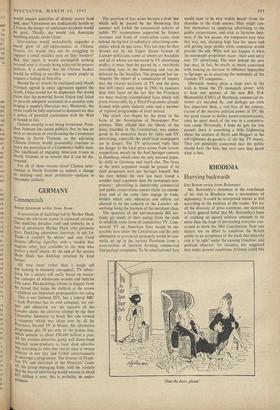SARAH GAINHAm writes from Bonn :
A procession of ducklings led by Mother Duck crosses the television screen in animated cartoon. One duckling detaches itself and embarks on a tour of adventure; Mother Duck cries glutinous tears. Duckling adventures intervene in ads for 'Dash—it couldn't be whiter' and sexy Curd iiirgens offering cigarillos with a twinkle that suggests other joys available to the man who Prefers a male' smoke. At the end of the section Mum Duck has duckling returned by kind farmer.
All very sweet rather than a tough sell and lacking in feminine sex-appeal; TV adver- tising for a society still really based on mascu- line concepts of wholesome women and babyish little jokes. The ducklings, kittens or doggies form the thread that keeps the children at the screen --children are important propagandists for sales. This is not German ITV, but a federal BBC 'each Province has its own company, for cul- ture and education are the concern of the Laender alone. An abortive attempt by the then Chancellor Adenauer to break this rule formed a company which was taken over by all the Provinces, Second TV at Mainz; this alternative Programme gets 30 per cent of the licence fees, Which amount to about L50-£60 million a year. All the stations advertise, going well down from national name-products to local shop advertis- ing, according to rules that restrict time to twenty minutes in any day and forbid advertisements to interrupt a programme. The director of Frank- furt TV and chairman of the Directors' Coun- cil, the group managing body, told me recently that the loss of advertising would amount to about 135 million a year; this is probably an under- estimate. The question of loss arises because a draft law which will be passed by the Bundestag this summer will forbid the commercial activity of public TV corporations supported by licence revenues and freed of corporation taxes, even behind the fig-leaf of subsidiary advertising com- panies which do pay, taxes. This law may be then thrown out by the Upper House formed of Laender politicians, some of whom are Socialists and all of whom are-interested in TV advertising profits; it must then be passed by a two-thirds overriding vote in the Bundestag and can...be defeated by the Socialists. The proposed law an- ticipates the report of a commission of inquiry into the relative positions of TV and the press that will report some time in 1966; its sponsors base their haste on the fact that the Provinces are busy making accomplished facts which will prove irreversible, by a Third Programme already formed with solely didactic aims and a number of regional programmes of local interest.
The attack was begun by the press in the form of the Association of Newspaper Pro- prietors. They alleged that the liberty of the press, founded in the Constitution, was endan- gered in its economic bases by radio and TV advertising; especially the small local newspapers are in danger. The , TV spokesmen reply that the danger to the local press comes from tycoon competition, mainly by the Axel Springer concern in Hamburg, which owns the only national popu- lar daily in Germany and much else. The force of the press argument Would be greater if its chief proponent were, not Springer himself. But the men behind the new law have found a sounder legal argument than the newspaper pro- prietors: advertiiing is indubitably commercial and public corporations cannot claim tax exemp- tions and at the same time engage in trade, besides which only education and culture are allowed to be the concern of the Laender, ad- vertising being the business of the merchant class.
The sponsors of the anti-monopoly Bill cer- tainly get much of their energy from the wish to establish some form of competitive TV. Com- mercial TV on American lines would be im- possible here under the Constitution and the only alternative to provincial monopoly would be con- sortia set up in the various Provinces from a cross-section of interests forming commercial (tax-paying) companies. To be constitutional they
would have to be very widely based—from the churches to the trade unions. They might con- fine themselves to supplying advertising to the public corporations, and stick to lucrative busi- ness; if the law passes, the companies may take this way out, charging high fees for space and still getting large profits while commerce would provide the ads. What will not happen is what the newspaper proprietors want—their own entry into TV advertising. The men behind the new law may, in fact, be nearly as much concerned with making an increase in influence impossible to Springer as in attacking the monopoly of the Laender TV companies.
Obviously money plays a large part in the wish to break the TV monopoly pbwer; with at least one sponsor of the new Bill, Erik Blumenfeld (CDU), of Hamburg, commercial in- terests are matched by, and perhaps are even less important than, a real fear of the concen- tration of the, massive political power of TV. He has good reason to dislike power-concentrations, since he spent much of the war in a concentra- tion camp. Personally, 1 hope he gets his law passed; there is something a little frightening about the mixture of Reith and Hoggart in the self-righteous do-goodery of the big TV bosses. They 'are genuinely concerned that the public should have the best, but very sure they knoW what is best.














































 Previous page
Previous page